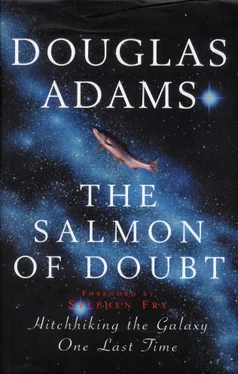So they started, and for two or three years the rice production went up enormously, but the whole predator/prey/pest balance went completely out of kilter. Very shortly the rice harvest plummeted again, and the Balinese said, “Screw it, we’re going back to the temple calendar!” and they reinstated what was there before and it all worked again absolutely perfectly. It’s all very well to say that basing the rice harvest on something as irrational and meaningless as a religion is stupid—they should be able to work it out more logically than that. They might just as well say to us “Your culture and society work on the basis of money and that’s a fiction, so why don’t you get rid of it and just cooperate with each other.” We know that’s not going to work!
Let me try to illustrate what I mean. This is very speculative. I’m really going out on a limb here, because it’s something I know nothing about whatsoever, so think of this more as a thought experiment than a real explanation of something. I want to talk about feng shui, which is something I know little about, but there’s been a lot of talk about it recently in terms of figuring out how a building should be designed, built, situated, decorated, and so on. Apparently we need to think about the building being inhabited by dragons and look at it in terms of how a dragon would move around it. So, if a dragon wouldn’t be happy in the house, you have to put a red fishbowl here or a window there. This sounds like complete and utter nonsense, because anything involving dragons must be nonsense—there aren’t any dragons, so any theory based on how dragons behave is nonsense. What are these silly people doing, imagining that dragons can tell you how to build your house? Nevertheless, it occurs to me that if you disregard for a moment the explanation that’s actually offered for it, it may be there is something interesting going on that goes like this: we all know from buildings that we’ve lived in, worked in, been in, or stayed in, that some are more comfortable, more pleasant, and more agreeable to live in than others. We haven’t had a real way of quantifying this, but in this century we’ve had an awful lot of architects who thought they knew how to do it, so we’ve had the horrible idea of the house as a machine for living in, we’ve had Mies van der Rohe and others putting up glass stumps and strangely shaped things that are supposed to form some theory or other. It’s all carefully engineered, but nonetheless, their buildings are not actually very nice to live in. An awful lot of theory has been poured into this, but if you sit and work with an architect (and I’ve been through that stressful time, as I’m sure a lot of people have), then when you are trying to figure out how a room should work, you’re trying to integrate all kinds of things about lighting, about angles, about how people move and how people live—and an awful lot of other things you don’t know about that get left out. You don’t know what importance to attach to one thing or another; you’re trying, very consciously, to figure out something when you haven’t really got much of a clue, but there’s this theory and that theory, this bit of engineering practice and that bit of architectural practice; you don’t really know what to make of them. Compare that to somebody who tosses a cricket ball at you. You can sit and watch it and say, “It’s going at seventeen degrees,” start to work it out on paper, do some calculus, etc., and about a week after the ball’s whizzed past you, you may have figured out where it’s going to be and how to catch it. On the other hand, you can simply put your hand out and let the ball drop into it, because we have all kinds of faculties built into us, just below the conscious level, able to do all kinds of complex integrations of all kinds of complex phenomena, which therefore enable us to « “Oh look, there’s a ball coming; catch it!”
What I’m suggesting is that feng shui and an awful lot other things are precisely of that kind of problem.
There are all sorts of things we know how to do, but don’t necessarily know what we do, we just do them. Go back to the issue of how you figure out how a room or a house should be designed, and instead of going through all the business of trying to work out the angles and trying to digest which genuine architectural principles you may want to take out of what may be a passing architectural fad, just ask yourself, “How would a dragon live here? We are used to thinking in terms of organic creatures; an organic creature may consist of an enormous complexity of all sorts of different variables that are beyond our ability to resolve, but we know how organic creatures live. We’ve never seen a dragon, but we’ve all got an idea of what a dragon is like, so we can say, “Well, if a dragon went through here, he’d get stuck just here and a little bit cross over there because he couldn’t see that and he’d wave his tail and knock that vase over.” You figure out how the dragon’s going to be happy here, and lo and behold you’ve suddenly got a place that makes sense for other organic creatures, such as ourselves, to live in.
Q. What is the fourth age of sand?
Let me back up for a minute and talk about the way we communicate. Traditionally, we have a bunch of different ways in which we communicate with each other. One way is one-to-one; we talk to each other, have a conversation. Another is one-to-many, which I’m doing at the moment, or someone could stand up and sing a song, or announce we’ve got to go to war. Then we have many-to-one communication; we have a pretty patchy, clunky, not-really-working version we call democracy, but in a more primitive state I would stand up and say, “Okay, we’re going to go to war,” and some may shout back, “No, we’re not!”—and then we have many-to-many communication in the argument that breaks out afterwards! In this century (and the previous century) we modelled one-to-one communications in the telephone, which I assume we are all familiar with. We have one-to-many communication—boy, do we have an awful lot of that—broadcasting, publishing, journalism, etc. We get information poured at us from all over the place, and it’s completely indiscriminate as to where it might land. It’s curious, but we don’t have to go very far back in our history until we find that all the information that reached us was relevant to us and therefore anything that happened, any news, whether it was about something that’s actually happened to us, in the next house, or in the next village, within the boundary or within our horizon, it happened in our world, and if we reacted to it, the world reacted back. It was all relevant to us, so, for example, if somebody had a terrible accident, we could crowd round and really help. Nowadays, because of the plethora of one-to-many communication we have, if a plane crashes in India we may get terribly anxious about it, but our anxiety doesn’t have any impact. We’re not very well able to distinguish between a terrible emergency that’s happened to somebody a world away and something that’s happened to someone round the corner. We can’t really distinguish between them anymore which is why we get terribly upset by something that has happened to somebody in a soap opera that comes out of Hollywood and maybe less concerned when it’s happened to our sister. We’ve all become twisted and disconnected and its not surprising that we feel very stressed and alienated in the world because the world impacts on us but we don’t impact the world. Then there’s many-to-one; we have that, but not very well yet, and there’s not much of it about. Essentially, our democratic systems are a model of that, and though they’re not very good, they will improve dramatically.
Extemporaneous speech given at Digital Biota 2, Cambridge, SEPTEMBER 1998
Читать дальше










